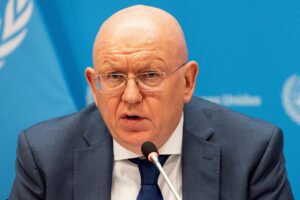UN Russian ambassador Vassily Nebenzia accused on Sunday, 22, the United States of opening a “Pandora box” by bombing Iran’s nuclear facilities and warned of the risk of a nuclear disaster if military climbing in the Middle East continues. In a security council speech, Nebenzia demanded the immediate termination of Washington and Israel’s actions and made a direct parallel between the current American offensive and Iraq’s invasion in 2003.
“Moscow condemns, in the most decisive terms, the unresponsible, dangerous and provocative actions committed by the US against the Islamic Republic of Iran,” said Nebenzia. According to him, the bombings violated the UN letter, international law and the resolutions of the Security Council itself. “The US has opened a Pandora box. No one knows which new disasters and sufferings this will bring,” he said.
Nebenzia warned of the risk of radiological contamination and stated that AIEA Director-General Rafael Grossi had warned days earlier about the possible unpredictable consequences of an attack on nuclear locations. “Responsibility for this climbing directly falls on the leadership of the United States,” he said.
Organize your financial life with AI
Nebenzia accused Washington of acting with disdain in relation to international law and said that the offensive puts it at risk not only regional security but also the future of the global regime for nuclear non -proliferation.
The Russian ambassador compared the current crisis to the US decision to invade Iraq 22 years ago. “The current situation remembers 2003, when the US invaded Iraq with false allegations,” he said. Nebenzia said the international community cannot repeat the mistake of relying on US justifications for unilateral military actions.
At the end of his speech, the diplomat charged an immediate response from the Security Council. “We demand the immediate cessation of the actions of Israel and the United States,” he said. He recalled that Russia, China and Pakistan presented a resolution project to the Council asking for the end of hostilities, the protection of civilians and the return to the diplomatic process. “If there is no firm response, the whole world can be seen before a nuclear disaster,” he concluded.











